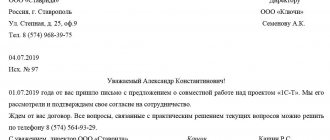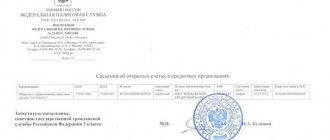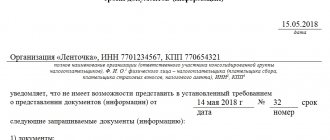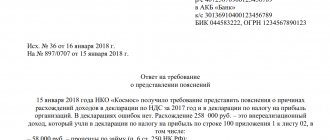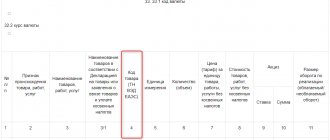Very often, when studying a specific issue, it is impossible to find a strictly defined solution in this regard in tax legislation. The Tax Code does not clearly state this; the Ministry of Finance interprets it in its own way; the tax authorities have a different point of view. The courts either side with the taxpayer or side with the tax authorities. What to do? How can a conscientious taxpayer protect himself and get a specific answer to his question? After all, no one wants to pay extra taxes, penalties and fines later.
The most reasonable solution is to write a request (letter) and clarify what to do in your specific situation. This right of the taxpayer is provided for in Article 21, subparagraphs 1 and 2 of paragraph 1.
What will a taxpayer receive in response to a request to government authorities?
According to subparagraph 3 of paragraph 1 and paragraph 2 of Article 111 of the Tax Code of the Russian Federation, the taxpayer will be exempt from liability
for committing a tax offense if he provided written explanations to financial, tax or other authorized government bodies within their competence on the application of tax legislation (the procedure for payment, calculation of taxes or fees).
In addition, according to paragraph 8 of Article 75 of the Tax Code of the Russian Federation, penalties will not be charged on
tax arrears that the taxpayer incurred as a result of following written instructions from financial tax or other authorized government bodies.
Thus, we can conclude that a written request and a targeted written response to it will give the taxpayer the opportunity to avoid liability if the taxpayer acted in accordance with written explanations.
How the Ministry of Finance surprised all lawyers with one letter
All the holidays I collected my thoughts to look at the results of the year from my tax and legal, so to speak, bump, and was about to write, but then suddenly the Ministry of Finance, with its letter dated December 13, 2019 No. 01-03-11/97904, made me so happy, that I will have to put aside the summary and tell one... no, not a fairy tale, but a true story.
***
One day, the Federal Tax Service decided to ask the Ministry of Finance how Art. 54.1 of the Tax Code: they say, it provides for a complete tax reconstruction or not. And as usually happens in such cases, the Ministry of Finance gave its answer the very next day. Or maybe it’s morning, or maybe it’s evening, but we just don’t know. Moreover, the letter was signed not by some deputy director of the Tax Policy Department, and not by the director, and not even by the deputy minister - whatever, take it higher! The Minister of Finance himself, and also the First Deputy Prime Minister, deigned to put his signature, sir (although previously they had never been seen wanting to explain tax legislation).
The Ministry of Finance supported the position of the Federal Tax Service set out in the request, and explained to it that 54.1, in contrast to the Resolution of the Plenum of the Supreme Arbitration Court of October 12, 2006 No. 53 on tax benefits, in the event of taxpayers abusing their rights, does not provide for the determination of tax obligations by calculation and taking into account expenses when calculating income tax.
To this explanation, the Ministry of Finance especially added references to the highest instructions - the message of the Russian President on the need for an irreconcilable fight against the erosion of the tax base through the use of fly-by-night companies.
A month has passed, the lawyers read that letter in telegram channels and began to think about it.
What is happening, good gentlemen? When Article 54.1 was being prepared, the Ministry of Finance stood modestly on the sidelines, as if it were a pretty girl, and didn’t utter a word, but now it’s explaining and explaining? Well, in the seventeenth year, he did not explain to the Sovereign Duma, the boyars, the dark envoys of the people, that it is necessary to clearly separate and prescribe in the tax law-code two cases, following the example of Article 170 of the Civil Code: when the operation is imaginary (there is none) and when it is feigned, i.e. e. covers the other one. In the first case, the tax service has the right to disqualify such an unsuitable transaction, that is, eliminate it when calculating tax liabilities. In the second case, the publicans must first say what real operation the pretend operation is covering up, i.e. retrain. And having said “az”, you must also say “buki”, namely, to determine tax obligations based on the covered transaction, thereby carrying out tax reconstruction (restoration of actual tax obligations). But the Ministry of Finance did not utter a word, like a stone.
So how does the Ministry of Finance now know what is contained in that article? Maybe he himself spent many years in an open field looking for these harmful, invisible to the naked eye, and fighting an unequal battle with them, and defended the budgetary truth in the courts? And thereby shaped law enforcement practice? And if law enforcement practice is not alien to him, then why did he forget the covenants of the Plenum of YOU? He also wrote in paragraph 8 of the Resolution No. 57 dated July 30, 2013, in black and white, that the settlement method is used both in the event that the payer does not have the relevant documents, and when they are recognized as improper.
And why does the Ministry of Finance undertake to explain some norms of legislation, while completely ignoring others? For example, about the fact that the decisions of the Plenum of the Supreme Arbitration Court continue to be in force until they are canceled by the Plenum of the Supreme Court. And what does the still valid Resolution of the Plenum of the Supreme Arbitration Court of October 12, 2006 No. 53 tell us in the very first paragraph? That the taxpayer's submission to the tax authority of all properly executed documents in order to obtain a tax benefit is the basis for receiving it, unless the tax authority proves that the information contained in these documents is incomplete, unreliable or contradictory. This means (back to Resolution 57), when applying the calculation method, it is necessary to take into account that when the tax authority determines the amounts of taxes by calculation, not only the taxpayer’s income, but also his expenses must be determined.
But the Supreme Court in paragraph 77 of the Plenum Resolution No. 25 dated June 23, 2015 says that if the court, based on an assessment of the evidence presented by the tax authority and the taxpayer, comes to the conclusion that the taxpayer did not take into account the transactions for tax purposes or did not take into account the transactions in accordance with their actual economic meaning, the court determines the scope of the rights and obligations of the taxpayer, based on the true economic content of a given operation or set of operations in their interrelation.
Again, in paragraph 14 of the Plenum Resolution No. 48 of November 26, 2019 “On the practice of courts’ application of legislation on liability for tax crimes,” the Supreme Court explained that in order to determine the amount of damage to the budget system caused by a tax crime, the court must establish the actual amount of payment obligations taxes, fees, insurance premiums in accordance with the provisions of the legislation on taxes and fees, take into account all factors, both increasing and decreasing the amount of unpaid taxes, fees and insurance premiums. That is, for criminal liability everything must be taken into account, but not for taxes?
And the Constitutional Court, in its Ruling No. 1440-O dated July 4, 2017, explains in detail that even if for tax purposes transactions are taken into account not in accordance with their actual economic meaning or transactions are taken into account that are not due to reasonable economic or other reasons (business purposes), then this involves additional assessment of the amount of taxes as if the taxpayer had not abused the right, on the basis of the relevant provisions of the Tax Code of the Russian Federation governing the procedure for calculating and paying a specific tax and fee.
Otherwise, arbitrary taxes will be levied that have no economic basis, which violates the constitutional principle enshrined in paragraph 3 of Art. 3 of the Tax Code, and the state will receive unjust enrichment. Anti-evasion rules are designed to ensure payment in an amount no less than the law, but cannot require more than the law. Therefore, the obvious legislative gap in Article 54.1 does not cancel the obligation of the tax authorities to carry out a complete tax reconstruction. After all, accounting for expenses and deductions for the amount of “VAT” paid in the purchase price to suppliers are not any preferences (as the tax service believes), but a mechanism for taxing profits and added value
The principle of good faith in tax administration must also not be forgotten, because, as the Supreme Court explained to us in the SKES Resolutions dated 02/16/2018 No. 302-KG17-16602 and dated 08/03/2018 No. 305-KG18-4557, it presupposes taking into account the legitimate interests of tax payers and the inadmissibility of creating conditions for levying taxes beyond what is required by law.
The result of a tax audit cannot be an additional accrual of arrears, which should not have arisen for the person being inspected if he had properly complied with the requirements of tax legislation (Definitions of the SKES dated October 28, 2019 in case No. A41-48348/2017, dated February 16, 2018 in case No. A33-17038 /2015, dated 03.08.2018 in case No. A40-93786/2017), and committing actions in circumvention of the law entails the application to the taxpayer of those provisions of the law that he sought to avoid (Definitions of the SCES dated 27.11.2015 in case No. A12-24270 /2014, dated July 22, 2016 in case No. A40-63374/2015).
And let me ask, how does the Ministry of Finance serve to determine the tax policy of Mother Russia if it does not know what any auditor, much less a tax consultant, will tell him: that without taking into account expenses, income tax turns into a tax on gross income? But the federal laws do not stipulate a tax on gross income; the last taxes on revenue were increased during the tax reform back in 2001. We got rid of these non-market taxes, because no economy, even one based on oil and gas, can handle 20 percent of gross income and 20 percent of revenue. I forgot, my dear. And it’s true, that was a long time ago, and there are almost no glorious heroes left at the outpost who have properly lowered the tax burden. Today's leaders are increasingly allowing rates to grow and non-tax taxes to proliferate and multiply, and there is a groan on our native land.
Or maybe the Ministry of Finance decided to take revenge on unreasonable defaulters - to condemn them to swords and fires, to punish them and punish them, so that they would be discouraging? Yes, I just forgot, apparently, that for non-payment there are already penalties of double size, and the fine is due from 20 to 40 percent. This is despite the fact that European practice generally excludes fines in the presence of tax abuses - paragraph 93 of the Decision of the EU Court of Justice of 02.21.2006 in the Halifax case.
But collecting a tax in excess of what is specified in the law is no longer a measure of legal liability provided for by law, which is unacceptable, as the Supreme Court indicated in the decisions of the SKES dated 03/06/2018 No. 304-KG17-8961, dated 04/05/2018 No. 305-KG17-20231, dated September 27, 2018 No. 305-KG18-7133, in the Review of Judicial Practice No. 2 (2018), approved by the Presidium on July 4, 2022. After all, the identification of an unjustified tax benefit involves additional assessment of the amount of tax payable to the budget in such a way as if the taxpayer had not abused the right, rather than applying an additional sanction.
In order to prevent the taxpayer from losing his rights, which existed during the times of “tax dishonesty,” the Plenum of the Supreme Arbitration Court, in paragraph 11 of Resolution No. 53, specifically explained that the court’s recognition of a tax benefit as unjustified entails a refusal to satisfy the taxpayers’ claims related to its receipt, but this should not affect other rights of the taxpayer provided for by law.
So, the Ministry of Finance proposes to collect one of two things - either illegal levies or illegal fines - with this explanation.
But in fact, if you carefully read 54.1, then the literal interpretation does not imply the calculation of tax without taking into account expenses and deductions. Point one, in other words: distortion of tax-significant facts should not lead to a reduction in the amount of tax payable to the budget. Income tax must be paid on profits, i.e. difference between income and expenses. This means that if we take into account real and not depicted expenses, then we do not at all reduce the tax in comparison with what is due to the budget, but only determine what is due. Same with VAT. So, in light of the recent Constitutional Court Resolution on VAT in bankruptcy, the issue of VAT can and should be raised again. Moreover, the Ministry of Finance itself states in its letter that 54.1 “does not establish a different procedure for applying its provisions in relation to obligations for specific taxes (expenses when calculating corporate income tax and deductions when calculating value added tax).”
Again, compare clause 1 of Resolution No. 53 on the concept of tax benefit and 54.1. In both cases we are talking about tax reduction. At the same time, reduction should be understood not simply as accounting for expenses and using deductions, but as tax savings. This is a key issue, but it was clearly resolved by both the Supreme Arbitration Court and the Supreme Court (Resolution of the Presidium of the Supreme Arbitration Court dated March 10, 2009 N 9821/08, SKES Determination dated June 15, 2017 N 305-KG16-19927).
By the way, the signing of a letter on the Ministry of Finance letterhead explaining the tax legislation and indicating the position of the first deputy prime minister also seriously puzzled the lawyers, because government officials are not granted the authority to officially interpret the Tax Code by law. Why is this position indicated, but not, for example, the position of dean of the Faculty of Finance and Economics of the Financial University and the degree of Doctor of Economic Sciences, although they might have been more appropriate in this case? And isn’t this a violation of the procedure for processing documents in government agencies, or even (it’s scary to even think about, let alone write) the procedure for exercising the powers of members of the Government?
***
In conclusion, on these New Year’s days, let me remind you of Hans Christian Andersen’s fairy tale “The King’s New Clothes”.
Two cunning people deceived the king: they sewed him a dress from “wonderful fabric that only a fool does not see.” The king himself does not notice the dress, although he is ashamed to admit it. All the courtiers around admire the king’s non-existent outfit, and now...
“And so the king walked through the streets under a luxurious canopy, and the people gathered in the streets said:
- Oh, how beautiful this new dress of the king is! How wonderful it sits! What a luxurious robe!
Not a single person admitted that he could not see anything, no one wanted to admit that he was stupid or sitting in the wrong place. No king’s dress has ever caused such admiration.”
Do you remember what happened next?
So: “Article 54.1 does not provide for tax reconstruction” does not literally mean that it “excludes”. Therefore, if the Ministry of Finance, with its letter, does not want to give the norms of Article 54.1 of the Tax Code a clearly unconstitutional character and thereby open a direct path to the Constitutional Court, it needs to quickly explain itself and dress up in this way: to say that yes, unfortunately, the article does not directly provide for tax reconstruction, although and should, therefore it is urgent to make additions to it in order to fill the gap in the law. Fortunately, the Ministry of Finance has all the capabilities for this, and a proposal from experts from the Analytical Center under the Government was recently sent to the Government with detailed wording.
Well, while the Ministry of Finance is (I hope) thinking about what it has done, there is one more good news about reconstruction. A second decision of the Arbitration Court of the Kemerovo Region has appeared, confirming the existence of tax reconstruction regardless of the legislator’s marriage and the unexpected discoveries of the Ministry of Finance - case No. A27-18448/2019, also with the participation of representatives of the central apparatus of the tax service. The reasoning is the same, but the decision is still worth reading. It is noteworthy in that it dealt with carriers not controlled by the taxpayer, so the court accepted all expenses in full. Also in it, the court spoke about how to approach the determination of the control of one-day companies (submitting applications for transport directly to vehicle owners and drivers does not mean it). The court also noted that the taxpayer’s guilt (intention or negligence/carelessness) should be determined at the time of economic relations with the counterparty, and not at the time of the tax audit. Those. we must proceed from what information the taxpayer had or could have had at the time of the transactions, as well as how he felt about it. The tax service did not appeal this decision, which may indicate its different approach to the consequences of connections with “its own” and “other people’s” one-day companies.
We reported about the first case earlier; the third hearing in the appeal court is scheduled for January 14. Let's see if the treasured letter will help the tax service. Was it really for this reason that the consideration was postponed and postponed?
How to use the tax or Ministry of Finance response received for another organization?
Note!
It makes no sense to use responses from the Ministry of Finance or tax authorities addressed to other organizations or individual entrepreneurs, because
An answer provided to another taxpayer and applied by you will not relieve you of liability
, because such letters do not have a regulatory status, but are of an informational and explanatory nature.
You can use the explanations of the Ministry of Finance only if they are sent to an unspecified circle of people.
How to request clarification of competition regulations
Participants in an open competition in electronic form, who are registered in the Unified Information System and accredited on the electronic platform, send a request for clarification of the documentation; 44 Federal Laws regulate this in Part 7 of Art. 54.3. Potential suppliers are asked to clarify the provisions of the tender documents through the electronic platform on which the tender is held.
The number of requests for clarification of the provisions of the tender documentation is limited. Participants have the right to request detailed information in relation to one open competition in electronic form three times. Within one hour after the request is received, it is sent by the operator of the electronic platform to the customer. Information about the potential supplier who submitted it is not disclosed.
IMPORTANT!
The customer is obliged to respond to the request within two working days from the date on which it was received. The answer is published in the EIS. The customer has the right not to respond if the participant requests additional information later than five days before the deadline for submitting applications.
In Art. 193 of the Civil Code states that if the last day of the period falls on a non-working day, the end day is considered to be the next working day following it. If the last day for submission falls on a holiday or weekend, then the participant has the right to ask for clarification on the first working day.
In Part 9 of Art. 54.3 states that explanations of the provisions of the tender documents should not change the essence of the tender.
IMPORTANT!
A bill is being considered that would allow participants in electronic quotations and requests for proposals to request clarification of the provisions of these procedures. You can submit your request no later than 3 calendar days before the application deadline. Auction participants will be able to submit requests 5 calendar days before the deadline for submitting bids. The deadline for competition participants will remain the same.
How to send a request (letter) to the tax office or the Ministry of Finance
You can contact the tax authority and the Ministry of Finance with a letter drawn up in two copies (you keep one copy with a mark of acceptance and the date of acceptance) in the following way:
- Contact your tax office at the place of registration of the organization or place of residence of the individual entrepreneur;
- Contact the Office of the Federal Tax Service for the region. In Moscow, the address of the Federal Tax Service is: 125284, Moscow, Khoroshevskoe highway, 12A;
- Contact the Central Office at the address: 127381, Moscow, Neglinnaya st., 23;
- Contact the Ministry of Finance of Russia at the address: 109097, Moscow, Ilyinka street, building 9.
In the letter, please indicate the full details of the organization and current legal address. The essence of the question should be clearly formulated, perhaps your intended answer to the described question should be stated.
If you need help preparing a message or are interested in accounting services, call (495) 661-35-70
Author: Shiryaeva Natalya
Write letters
Taxpayers can submit a written appeal in person to the office of the tax authority, or send it by mail or electronically (clause 37 of the Regulations). A recommended sample form of a written request is given in Appendix 4 to the Regulations.
In this case, the written request must contain the following mandatory information (clause 40 of the Regulations):
- for an individual: last name, first name, patronymic, signature and postal address;
- for an organization: full name, TIN, postal address, last name, first name, patronymic and signature of the head or authorized representative of the organization who submitted the application, an image of the organization’s seal if the application is submitted on paper other than company letterhead.
If the written appeal submitted to the inspection by the taxpayer in person is missing at least one of the specified details and if there are grounds on which free information can be refused, in accordance with paragraph 42 of the Regulations, the appeal must be returned to the taxpayer.
Clause 39 of the Regulations allows 30 days from the date of registration of the appeal to prepare a written response.
We recommend that all written requests be submitted in duplicate. If you decide to personally submit an appeal to the inspectorate, then on the second copy the tax authority official must put a mark on acceptance of the appeal and the documents attached to it, indicating his surname, initials and position, as well as the date of its acceptance. Applications sent by mail are recommended to be submitted by registered mail with notification and a description of the attachment. The date of submission of the written request will be considered the day of dispatch. If you send a letter via communication channels, you must receive a message stating that the letter was sent from a specialized operator and confirmation of receipt from the tax authority.
Answers on questions
Information on processing documents regarding a traffic accident without the participation of authorized police officers
Federal Law No. 40-FZ dated April 25, 2002 “On compulsory civil liability insurance of vehicle owners” provides for the possibility for drivers to draw up documents about a traffic accident without the participation of authorized police officers
Information on the issue of concluding and terminating insurance contracts drawn up when concluding consumer credit (loan) agreements
In connection with incoming requests from citizens regarding the conclusion and termination of insurance contracts drawn up when concluding consumer credit (loan) agreements, the Ministry of Finance of Russia considers it necessary to note the following.
The procedure for foreclosure on funds from budgets of the budget system
What judicial acts are executed directly by the Ministry of Finance of the Russian Federation
In accordance with paragraph 1 of Article 242.2 of the Budget Code of the Russian Federation, the Ministry of Finance of Russia is entrusted with the execution of judicial acts on claims against the Russian Federation for compensation for damage caused by illegal actions (inaction) of state bodies of the Russian Federation or their officials, including as a result of publication by state bodies of the Russian Federation of acts that do not comply with the law or other regulatory legal act, as well as judicial acts on other claims for the collection of funds from the treasury of the Russian Federation (with the exception of judicial acts on the collection of funds in the manner of subsidiary liability of the main managers of federal budget funds), judicial acts on the award of compensation for violation of the right to trial within a reasonable time or the right to execution of a judicial act within a reasonable time at the expense of federal budget funds.
Entry of a judicial act into legal force and issuance of a writ of execution by the court
Judicial acts, if they have not been appealed, enter into legal force upon the expiration of the period for appeal. The deadlines for appealing a judicial act are established by the procedural legislation of the Russian Federation. If an appeal is filed, court decisions come into force after the appeal is considered by the court.
Deadlines for submitting writs of execution (writs of execution) for execution
The current legislation of the Russian Federation provides for the following deadlines for the presentation of executive documents for execution:
Restoring the missed deadline for presenting a writ of execution for execution
A claimant who has missed the deadline for presenting a writ of execution or a court order for execution has the right to apply to the court to restore the missed deadline.
What documents must be sent to the Ministry of Finance of the Russian Federation for the execution of a judicial act
Requirements for executive documents
In accordance with Article 13 of the Federal Law of 02.10.2007 No. 229-FZ “On Enforcement Proceedings”, the enforcement document, with the exception of the resolution of the bailiff, the court order, the writ of execution of the notary and the notarized agreement on the payment of alimony, must indicate:
Bank account details of the claimant
The Budget Code of the Russian Federation stipulates that a writ of execution sent for execution must be accompanied by details of the claimant’s bank account* to which the funds to be collected must be transferred
Deadlines for the execution of judicial acts by the Russian Ministry of Finance
In accordance with paragraph 6 of Article 242.2 of the Budget Code of the Russian Federation, the Ministry of Finance of the Russian Federation executes judicial acts within three months from the date of receipt of enforcement documents for execution.
The most common reasons for the return of executive documents by the Ministry of Finance of the Russian Federation of executive documents without execution
The grounds for the return of executive documents without execution are established by the budgetary legislation of the Russian Federation.
Useful materials
Obtaining information on the progress of consideration of citizens' appeals
In this section you can obtain information about the progress of consideration of a citizen’s appeal sent to the Ministry of Finance of the Russian Federation.
To receive information on the request, enter its number.
In order to implement the instruction of the President of the Russian Federation dated February 24, 2012 No. Pr-494 regarding providing applicants with access in the “Personal Account” section on the official website of the President of the Russian Federation on the Internet to the results of consideration of citizens’ appeals by the Ministry of Finance of the Russian Federation in this section, it is possible to obtain information on the progress of consideration of a citizen’s appeal sent electronically through the official website of the President of Russia.


